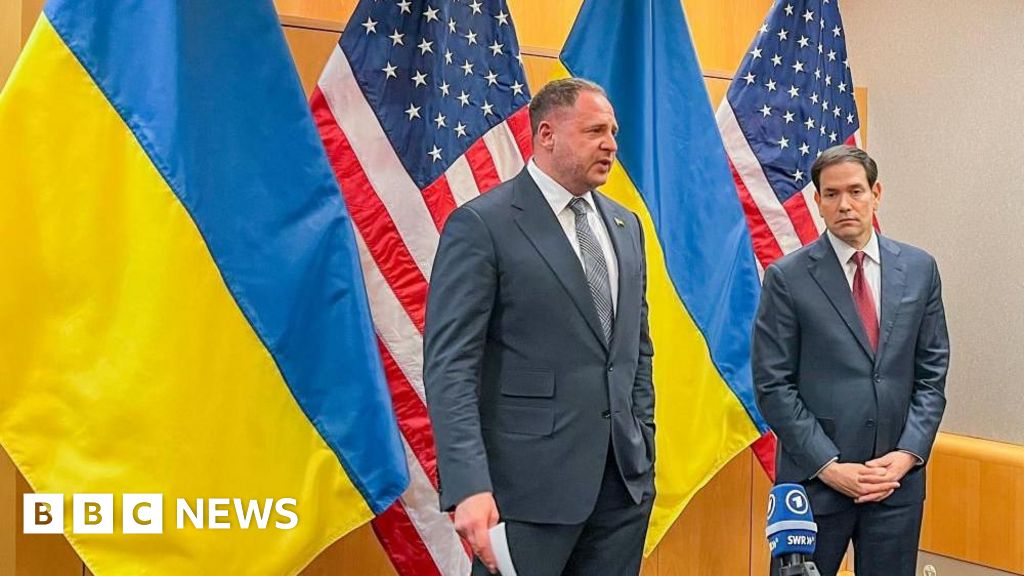Updated Peace Plan for Ukraine Emerges from Intense Geneva Talks
The diplomatic landscape surrounding the ongoing conflict in Ukraine has witnessed a significant shift, with a new, substantially revised peace framework taking shape after intense negotiations in Geneva. What began as a push from the US, seemingly influenced by figures like Donald Trump, to compel Kyiv towards terms bordering on surrender, met fierce resistance from Ukrainian officials. However, a day of frantic shuttle diplomacy involving senior national security advisers from the US, Ukraine, Germany, France, and the UK culminated in an updated and revised framework document
that is considerably more amenable to Ukraine's demands.
From Stony Faces to "Tremendous Progress"
Ukrainian chief negotiator Andriy Yermak's initial stony-faced demeanor in Geneva was a clear indicator of the challenging starting point. The original proposal, widely perceived as heavily biased towards Russia's demands, was so contentious that US Secretary of State Marco Rubio found himself denying allegations of Kremlin authorship. Despite the unfavorable terms, Trump's insistence on a swift resolution, coupled with threats of unspecified consequences,
left Kyiv with little choice but to engage in the talks.
By Sunday night, Rubio declared tremendous progress
had been made, signaling a potential breakthrough. The Financial Times, quoting Ukraine's deputy foreign minister Sergiy Kyslytsya, revealed details of a new 19-point plan, dramatically different from its initial draft. Crucially, this updated document integrates key European amendments previously highlighted by Reuters.
Key Revisions: NATO, Territory, and Security Guarantees
- An automatic veto on Ukraine's future NATO membership has been removed.
- Caps on the country's armed forces' troop numbers have been lifted.
- While permanent Western troop deployment to Ukraine is still excluded, the ban is not absolute.
Perhaps most vital for Kyiv, the revised plan eliminates the demand for a free handover of the remaining Donbas region to Russia. Instead, it proposes that Ukraine aims to recover occupied territories exclusively through diplomatic means—a position President Volodymyr Zelensky has previously accepted. Furthermore, the provision for a full amnesty for war crimes has been deleted.
A cornerstone of the new framework is the inclusion of security guarantees. Several European officials, including UK Prime Prime Minister Sir Keir Starmer, have hinted at Article 5-style protection
for Ukraine, implying a binding commitment from the US to defend Ukraine against any future Russian aggression. This specific issue has always been a fundamental, non-negotiable red line
for Kyiv. Germany's Chancellor Friedrich Merz has commendably described the deal as significantly modified
in a positive sense.
The Road Ahead: Russia's Unyielding Stance
The rapid evolution from a seemingly pro-Russian proposal to one potentially acceptable to Ukraine raises questions, particularly considering the initial influence of US figures like Steve Witkoff, whose earlier meetings with Vladimir Putin reportedly shaped the original draft, echoing Russian narratives. This shift suggests that even Donald Trump, despite his earlier criticisms of Kyiv's zero gratitude,
now perceives something good
on the horizon.
However, the path to lasting peace remains complex. Tatiana Stanovaya of the Carnegie Russia Eurasia Center highlights that Vladimir Putin's military confidence is currently high, influenced by internal Ukrainian political and mobilization challenges, coupled with Russian battlefield gains. Ultimately, while Trump's demand for a deal may have injected new momentum into peace efforts, the fundamental challenge persists: Russia shows no signs of yielding unless compelled to do so.
As Stanovaya succinctly puts it, Russia's position remains: We have laid out our demands, so do you take them or not? If so, we will stop the war – if not, we'll just wait until you're ready.
Despite the frantic diplomacy in Geneva bringing discussions closer to Ukraine's terms, Russia's willingness to engage meaningfully remains the ultimate and most formidable hurdle.

